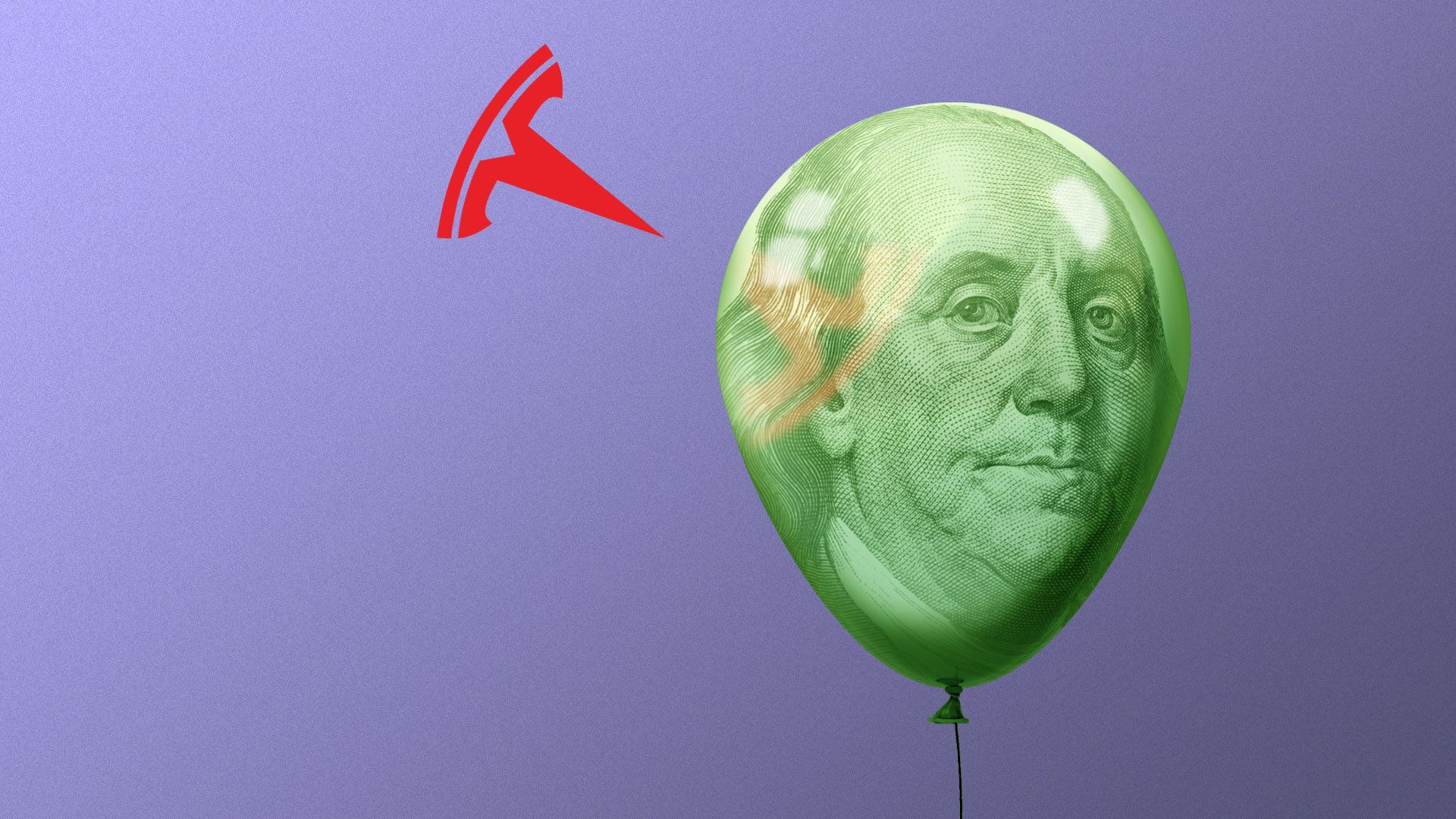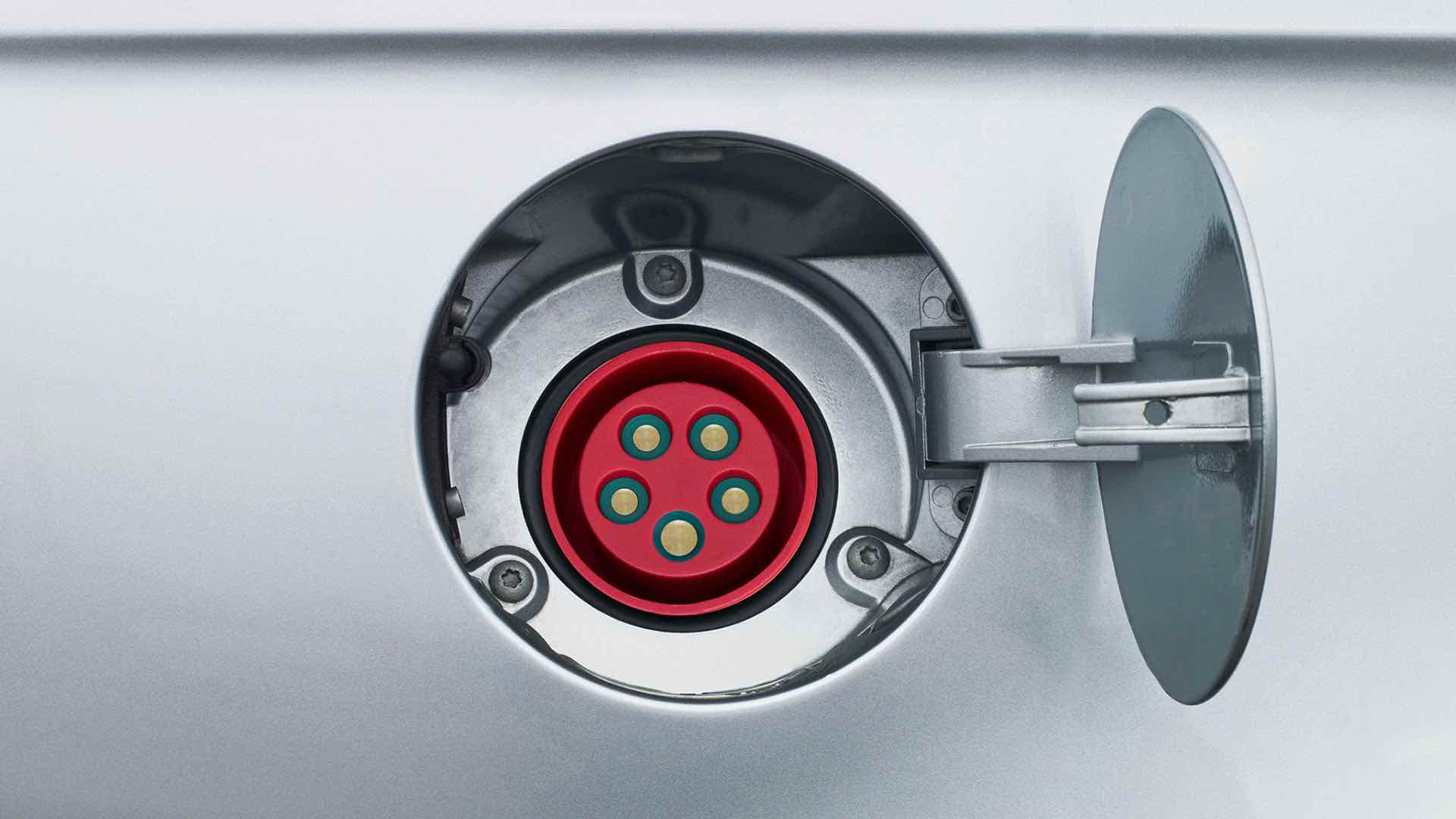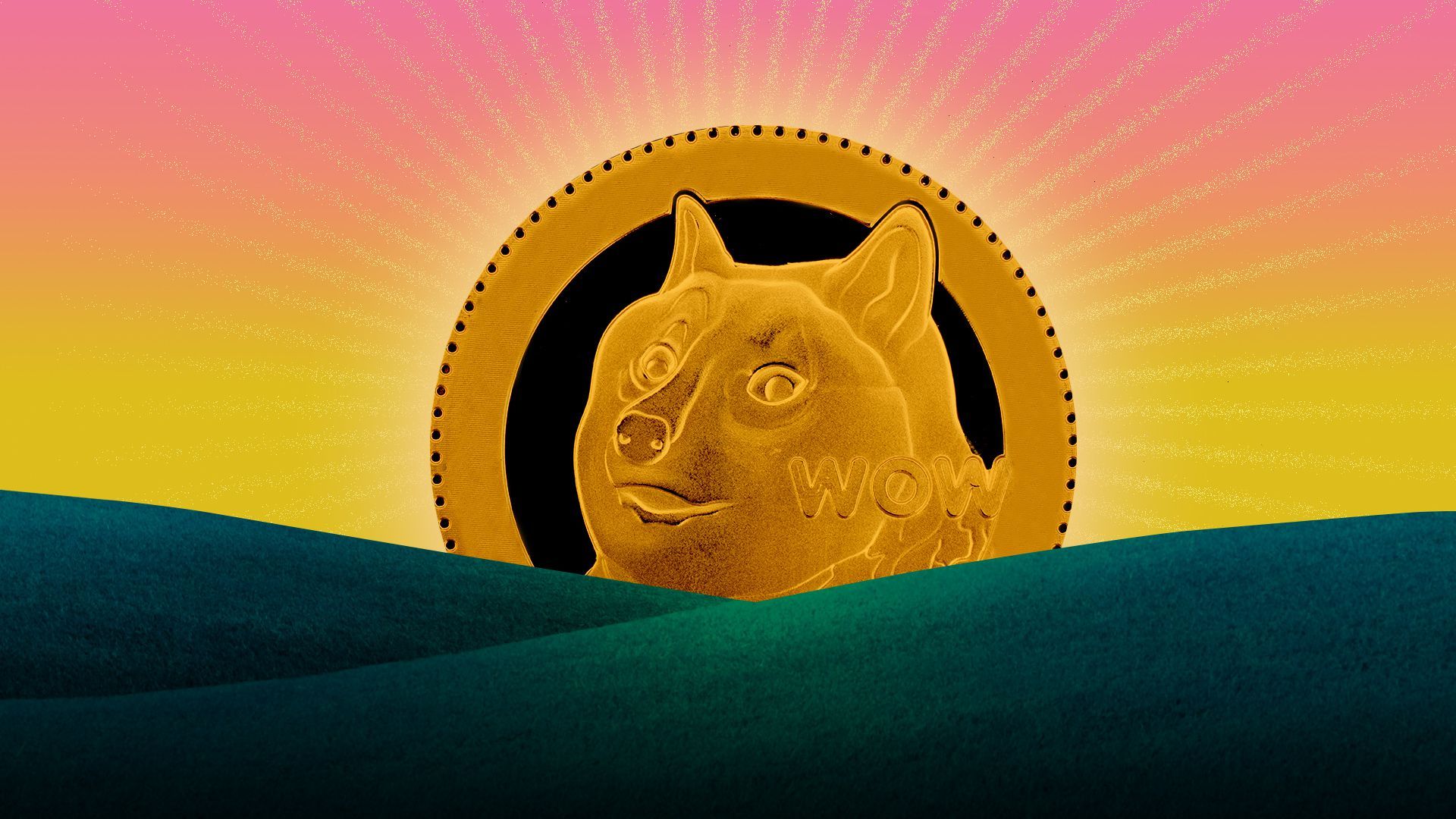| | | | | | | Presented By BlackRock | | | | Axios Markets | | By Dion Rabouin ·Feb 09, 2021 | | Good morning! Was this email forwarded to you? Sign up here. (Today's Smart Brevity count: 1,350 words, 5 minutes.) 🩰 Trivia: This man, whose name is synonymous with dance, created the choreographic masterpiece "Revelations," which is recognized as one of the most popular and most performed ballets in the world. Though he died in 1989, in 2008, Congress passed a resolution designating his dance theater a "vital American cultural ambassador to the World." | | | | | | 1 big thing: Losing faith in the dollar |  | | | Illustration: Sarah Grillo/Axios | | | | Large and respected institutions, including a $1 trillion company run by the richest person on earth are starting to worry about the world's institutions, most notably the stock market and fiat currencies, and they are taking steps to hedge the risks. Why it matters: Tesla's announcement that it will invest its reserves in bitcoin and gold as well as dollars makes the company part of a growing movement away from the greenback, which has long been the world's primary and most trusted store of value, and the largest and most high-profile company to do so. - The $1.5 billion bitcoin investment accounts for nearly 8% of Tesla's cash assets.
What we're hearing: As central banks continue to push trillions of dollars a month into markets more firms are starting to see holding dollars as a risk, Axel Merk, president and portfolio manager at Merk Hard Currency Fund, tells Axios. - "The world doesn't move on facts, it moves on perception," Merk says.
- "Do you think there's a risk that the dollar is going to decline, going to debase? If you think it's a risk that's noteworthy, what are you going to do about it? These things become more of a self-fulfilling prophecy if more and more people endorse their view."
The big picture: Tesla is the latest and largest to announce an investment in bitcoin, but not the first. - Insurance giant MassMutual, in business since 1851, purchased $100 million of bitcoin for its general investment fund and acquired a $5 million minority equity stake in institutional crypto manager NYDIG.
- Square, PayPal and Visa all announced investments and ventures allowing bitcoin payments on their platforms.
- Business intelligence firm MicroStrategy said in December it had purchased a sum total of 40,824 bitcoins, current value $1.7 billion, and had sold bonds to raise the capital to do so.
Don't sleep: While developed market central banks have been printing money, central banks in emerging markets have been gradually adding to their holdings of gold rather than dollars, especially countries like China, Turkey and India. - Russia has increased its gold holdings so much that its central bank now holds more gold than dollars.
Yes, but: The overwhelming majority of companies' and countries' reserves remain in dollars. Be smart: It's not just the dollar companies and individuals are losing faith in, Douglas Borthwick, chief marketing officer and head of business development at crypto trading platform INX, tells Axios. It's fiat currencies overall. - "Why save your wealth in a currency at a bank with a negative interest rate when your government is printing and distributing even more of that same currency out of thin air?" says Borthwick, who was previously managing director at Chapdelaine FX Trading.
- "Your own wealth and currency becomes worth less. Fiat currencies are not going away. Neither is money printing."
|     | | | | | | Bonus chart: Gold underperforms |  Data: FactSet; Chart: Axios Visuals By engaging in quantitative easing and convincing market participants that they stand ready to print a literally endless amount of money in an effort to buoy their respective economies, the world's central banks have eroded the perceived value of their currencies, experts say. - Using that money to buy bonds drove down the value of fixed-income instruments and made their interest payments negligible and often negative ($18 trillion of the world's bonds currently hold negative yields).
- Central banks' implicit promise to step in if asset prices fell significantly has pumped stock indexes to extreme valuations and eroded trust in the equity market.
- The expected increase of trillions of dollars of government spending is further fueling fears of assets losing their value.
What's happening: As bitcoin's price has driven higher, more firms and individuals are embracing it over traditional inflation and currency debasement plays like gold. - Its status as an asset outside the control of typical "elites" or institutions is adding to its popularity, but its primary draw is likely the mesmerizing price appreciation.
|     | | | | | | 2. Catch up quick | | The CBO's latest report finds that a $15 minimum wage would cost 1.4 million jobs but would increase income overall and pull 900,000 people out of poverty. (Bloomberg) State revenues fell 1.6% in fiscal year 2020 and were 3.4% lower than projected before the pandemic, but 18 states are seeing revenues come in above forecast. (WSJ) Almost 10% of Americans have received at least one COVID-19 vaccination shot. (WSJ) The average yield on U.S. junk bonds fell below 4% for the first time ever. (Bloomberg) |     | | | | | | A message from BlackRock | | Taking action toward a net-zero transition | | |  | | | | The human and economic tolls of climate change present one of the greatest challenges of our time – with profound implications for investors around the world. Learn how BlackRock is helping our clients navigate this transformation and capture opportunity. | | | | | | 3. Stimulus, the yield curve and reopening hopes help small caps boom |  Data: FactSet; Chart: Axios Visuals Despite the incredibly weak job market investors are betting the U.S. economy will continue to strengthen and are pouring money into small-cap stocks. What's happening: Small companies' stocks have lagged their large counterparts for years as bigger has meant better on Wall Street. But over the past six months, that trend has reversed and investors are playing small ball. What it means: "Small cap stocks tend to outperform as the economy improves," ADP senior economist Nela Richardson tells Axios in an email. - "The prospects for continued economic recovery are solid given the vaccine rollout, pent-up consumer demand, ongoing monetary stimulus and perhaps more fiscal stimulus. Hence, conditions are set for which small caps have outperformed historically, (even though the jobs recovery has cooled recently)."
The big question: "Does the rally have legs?" asks Richard Steinberg, chief market strategist of the Colony Group. - "As long as data show that vaccines are starting to work and there's a policy to get more shots in people's arms we are going to get more confidence."
- "We're seeing the numbers in earnings too. There's leverage to the reopening."
Watch this space: The widening U.S. Treasury yield curve (the 5-year/30-year spread rose to 1.5% Monday, the highest since September 2015) also provides a boost for small-cap stocks because banks and financial services companies, which see their share prices rise as longer-dated bonds' yields go up, are over-represented among small-cap indexes, Steinberg adds. - "The yield curve and reopening and fiscal stimulus all play into small caps with a domestic focus."
But, but, but: For the bounce in small-cap stocks to continue, the market's extremely rosy expectations will have to become reality. |     | | | | | | 4. The meme economy arrives |  | | | Illustration: Aïda Amer/Axios | | | | Axios' Felix Salmon writes: Attention is a commodity, which means that memes — a way of focusing and scaling attention — are a way to create value. No one understands this better than Elon Musk. Why it matters: People expert in propagating memes are finding that their skills can make them millions — or, in the case of Musk, even billions. Driving the news: Tesla converted $1.5 billion of its cash into bitcoin last month. When the news of the purchase became public on Monday, the value of the world's bitcoin rose by about $90 billion while the value of Tesla rose by about $8 billion. Since Musk owns more than 20% of Tesla, his own net worth went up by well over $1 billion as a result of the announcement. - The price action ratified Musk's power as a memelord — someone who can focus the attention of millions on a single meme.
- In recent weeks he has also helped to pump up the price of dogecoin, a joke cryptocurrency with no supply constraints; there are now so many dogecoins in circulation (almost 130 billion) that their total value exceeds $10 billion.
- Other dogecoin pumpers include Snoop Dog, Gene Simmons and social-media influencer Amanda Cerny.
Big Pump Signal, a shadowy group of cryptocurrency pump-and-dump merchants, makes up for its lack of boldface names with its sheer mass of participants. Roughly 250,000 people bid up small alt-coins when they're announced every other day, trying to buy before they peak and sell before they inevitably fall. What to watch: If you take the logic of artificial scarcity to its ludicrous logical conclusion, you would end up with something like Birkinstocks, sandals priced at between $34,000 and $76,000 per pair that are made from destroyed Hermès Birkin bags. - Rap star Future managed to snag one pair before they even went on sale Monday, posing on his Instagram with footwear made from a $48,000 crocodile-skin bag.
- MSCHF, the company behind the Birkinstocks, specializes in creating viral content that reveals the absurdity of the contemporary economy — while also making a tidy profit. Each pair of Birkinstocks costs almost double the price of the bag that it's made from, and each bag produces at least two and possibly even three pairs of shoes, depending on how big the buyers' feet are.
- Expect a large chunk of MSCHF's profits to go towards defending the inevitable copyright-infringement lawsuit from Hermès.
The bottom line: The meme economy is where FOMO meets YOLO. Engage only with your irony dial set to 11. |     | | | | | | A message from BlackRock | | Why does net-zero matter for investors? | | |  | | | | The net-zero economy is arriving. Jessica Tan, BlackRock's Head of Corporate Strategy, discusses why now is a pivotal point and outlines the meaning of the energy transition for investors, companies and society in this episode of BlackRock Bottom Line. | | | | Thanks for reading! Trivia: This man, whose name is synonymous with dance, created the choreographic masterpiece "Revelations," which is recognized as one of the most popular and most performed ballets in the world. Though he died in 1989, in 2008, Congress passed a resolution designating his dance theater a "vital American cultural ambassador to the World." Answer: Alvin Ailey. | | | | Axios thanks our partners for supporting our newsletters.
Sponsorship has no influence on editorial content. Axios, 3100 Clarendon Blvd, Suite 1300, Arlington VA 22201 | | | You received this email because you signed up for newsletters from Axios.
Change your preferences or unsubscribe here. | | | Was this email forwarded to you?
Sign up now to get Axios in your inbox. | | | | Follow Axios on social media:    | | | | | |







No comments:
Post a Comment